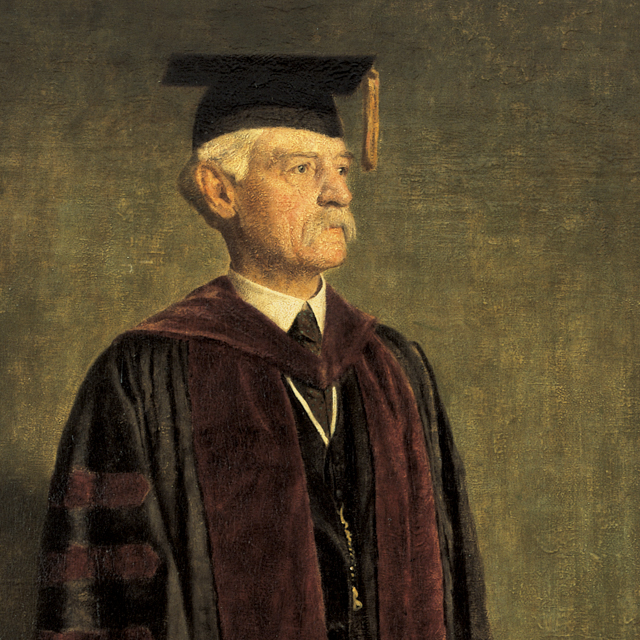Frederic Aldin Hall was born in Brunswick, Maine, in 1854, the son of a farmer. At the age of 17 he settled on a farm of his own in Illinois but quickly gave up farming to enter college.
After a brief stint at the Academy of Olivet College in Michigan, he transferred to Drury College in Springfield, Missouri, where he developed a love for the classics and began a career that led him to become one of the nation’s most distinguished scholars of Greek.
A gifted educator and noted orator, upon graduation from Drury he accepted the position of principal of Drury Academy, a position he held for 13 years. Following a year of study in Germany, he was elected Goodell Professor of Greek at Drury College and was named dean in 1898.
The war has helped in bringing about a solidarity of interests at the university previously unknown. It has helped more than any single thing to identify all the schools of the university as parts of a whole.…In France, in the various cantonments, wherever graduates of Washington are, they now speak of themselves as Washingtonians regardless of whether they come from the Law School, the Medical School, or any other department.
Frederic Aldin Hall, “Address at the Meeting of the Alumni Association of Washington University,” City Club, March 8, 1918
He joined Washington University in 1901 as Collins Professor of Greek. He helped shape the educational policies of the college and was instrumental in strengthening the Department of Greek. He was appointed dean of the college in 1913, a position he held for just one year before being appointed acting chancellor for Chancellor Houston, who was on leave, serving as U.S. Secretary of Agriculture. He assumed the full chancellorship in 1917 and served until 1923, three years past the retirement age of 65. He died two years later.
Later, Chancellor Throop wrote of Hall: “It is fortunate for the university that at the time of its greatest period of development it had at its head this kindly, level-headed gentleman, respected and loved both at Washington University and in the city, who guided all so sympathetically and so wisely.”
He was by many accounts a fair and kind man, and during his time as chancellor he strengthened the graduate programs and established a business program. In 1922 he established a new School of Graduate Studies and in 1917 a School of Commerce and Finance. He guided the university through the years of World War I and the phenomenal growth that followed the war. Among his most important recruits was the 1920 hiring of Arthur Holly Compton, a promising young physics professor who would go on to win the Nobel prize and return years later as Washington University’s ninth chancellor.
A silver cup given to him from the faculty upon his retirement bears these words:
“Beloved teacher, wise counselor, inspiring leader, firm friend during a period of service. Fortunate and fruitful for the university, one of those rare men with the heart to conceive, the understanding to direct and the hand to execute.”
Notable dates
1915: In April, a gala, three-day ceremony marked the dedication of the new medical complex on Kingshighway.
1917: In May, a group led by medical students and faculty departed for Rouen, France, where they staffed Base Hospital No. 21, a military hospital organized by the American Red Cross.
1917: The School of Commerce and Finance opened.
1918: Aphrodite Jannopoulo, Carol Skinner Cole, and Faye Cashatt became the first women medical students at Washington University in St. Louis.
1919: Soldiers returning from World War I swelled the university’s enrollment to more than 3,000 students.
1920: Arthur Holly Compton came to the university as Wayman Crow Professor of Physics and head of the physics department.
1922: The board approved a School of Graduate Studies.
